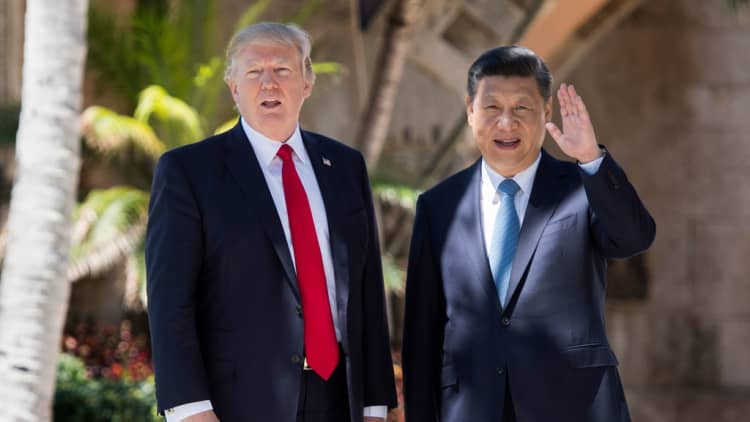
Stocks staged a marked turnaround to the downside Monday as the S&P 500 sank back below a key chart level and investors believed a likely trade resolution between the U.S. and China is baked in.
The dropped 0.4 percent to 2,792.62 after climbing nearly half a percent, breaking back below the key 2,800 level. The broad index closed above 2,800 on Friday, marking its highest close since Nov. 8.
The Dow Jones Industrial Average fell 206.67 points to 25,819.65, erasing a 129.66-point gain. Boeing was one of the worst performers in the Dow, sliding 1.8 percent. The Nasdaq Composite closed 0.2 percent lower at 7,577.57. Earlier in the day, it was up as much as 0.64 percent.
"The market on all technical levels was the most overbought we've been" in a while, said Larry Benedict, founder of The Opportunistic Trader. "The market is just overextended."
"You're also going to start seeing some skepticism on the China front," Benedict said. "Everybody thinks this is a done deal. I don't know how easy it's going to be."
Stocks started giving back their gains after the Commerce Department said construction spending dropped 0.6 percent in December. Economists polled by Refinitiv had forecast a gain of 0.2 percent. The indexes also rolled over as the S&P 500 tech sector fell 0.4 percent. Shares of Salesforce were the biggest decliners in the sector, sliding more than 3 percent ahead of their quarterly earnings release.
Equities began the session on a positive note, with shares up after the opening bell on news that a trade deal between the U.S. and China was nearing completion. Many investors, however, decided to sell on the upbeat headlines and argued that the indexes had already accounted for an agreement between the two economic powerhouses.
"Markets expect a deal by the end of March, but the key here will be whether the deal results in the removal of all tariffs," said Tom Essaye, founder of The Sevens Report. "The reports this morning imply that might happen, but it will have to become reality for US-China trade to provide a sustainable positive catalyst for stocks."
Sources told CNBC that U.S.-China trade negotiations are in the "final stages" as the two sides prepare for a possible summit at Mar-a-Lago at the end of March. If a deal is reached, the U.S. could roll back tariffs on at least $200 billion in Chinese goods while China would remove or cut industry-specific levies like those on autos.
However, the U.S. wants the ability to re-impose levies on Chinese goods if talks fail on enforcement mechanisms on intellectual property theft and related matters. According to sources, this is not sitting well with the Chinese.
The New York Times also said in a report that the trade deal being discussed would do little to address key structural issues. These include efforts by the Chinese to curb cybertheft and subsidies the Trump administration argues make it harder for U.S. companies to do business in China.
"The news has been priced into U.S. equities," said John Davi, chief investment officer at Astoria Portfolio Advisors. "But if you take a step back, positioning is still pretty light in U.S. equities, so even though we think everything is priced in, we could rally a little bit more. People haven't re-risked their portfolios since December. If you look at fund flows … it's still very light on the positioning side for U.S. stocks."
The back-and-forth on trade between the two countries has sent ripples through financial markets since last year, with investors fretting how tighter trade conditions could impact corporate profits.
—CNBC's Silvia Amaro contributed to this report.






